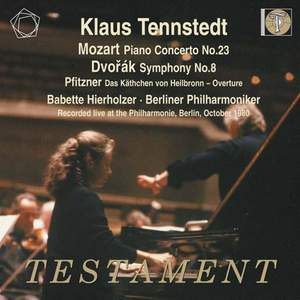In October 1980 Klaus Tennstedt conducted three evenings of classical and romantic music. The opening work was Hans Pfitzner’s rarely-heard overture to Heinrich von Kleist’s play Das Käthchen von Heilbron. Pfitzner felt, and indeed referred to, a certain affinity with Kleist. The poet’s Hermann’s Battle makes its appearance in Pfitzner’s Song of the Bards for male chorus, horns, violas and cellos. It was above all the romantic subject matter and the atmospherically charged scenes of the play that most inspired his six-part Käthchen music. This is a richly coloured work which could almost have been written for Tennstedt. Walter Kaempfer wrote in the Tagesspiegel that the overture could be convincingly interpreted only in the mode of a fantasy, as it was in Tennstedt’s reading. "Graf Wetter vom Strahl’s earthy chivalry was vividly contrasted with the ‘sweet-scented elder’ of the enraptured Käthchen in the enchanting bird-song of the Philharmonic’s woodwind; here were the very archetypes of romantic fantasy-in-sound, in a bewitching vividness spellbindingly communicated to the audience." The soloist of the evening was the twenty-three-year old Babette Hierholzer, who had made her début with the Berlin Philharmonic in 1978. Born in Freiburg, this pianist settled in Berlin in 1964 and trained in Berlin, Essen, New York and in Italy. Her teachers included Paul Badura-Skoda, and she won prizes in a number of competitions. In the A major Mozart Concerto she showed a total rapport with orchestra and conductor; one critic (Wolfgang Schultze) spoke of the "seamless" give-and-take and interplay between piano and orchestra. Walter Kaempfer was impressed by the pianist’s technical excellence, her calm shaping of the outer movements of this famous piece, and the expressive phrasing and subtle "breathing" evident in her understanding of the nuances in the Adagio. There followed an electrifying reading of Dvorˇák’s Eighth Symphony. "Tennstedt and his splendidly responsive orchestra between them conjured up a veritable firework display in their Dvorˇák, full of vigour, musical exuberance and lively playfulness. All those instrumental subtleties which are so often missing in this music were in evidence in this performance." (Wolfgang Schultze). Tennstedt liberated the symphony from the routine of everyday performances and presented something quite new, laden with energy and emotional character. According to the Tagesspiegel critic, "not a single nuance or impulse was lost; every crescendo became an inspiring adventure." Tennstedt had proved his indispensable worth among all the guest conductors with the Berlin Philharmonic, and without question his departure left "a void in the programme of the orchestra which could be filled only at the very highest level."
from the booklet note © Helge Grünewald, 2010



